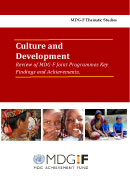

Culture and Development
 Eradicate Extreme Poverty and Hunger
Eradicate Extreme Poverty and Hunger
Respect for cultural diversity promotes vibrant and inclusive societies.
Strengthening creative industries and protecting natural and cultural heritage have proved to be effective instruments of economic development. Our work has harnessed the potential of the creative sector for job creation, economic growth and poverty reduction and supported efforts to promote the inclusion of minorities in social, political and cultural life. We have worked extensively with indigenous communities to safeguard their cultural heritage and to build health and education services that respond to their worldviews.
Our 18 programmes in this area focused on cultural rights, social inclusion and increasing the cultural heritage and tourism potential of countries, with the aim of reducing poverty, increasing employment and improving socio-economic opportunities for marginalized segments of the population. Our work particularly emphasized women's participation, and we worked with indigenous and ethnic groups and governments to increase cross-cultural understanding within countries.
In Cambodia, training women in the crafts sector not only increased their income, it also enhanced their role in the household and the community, which in turn lowered the incidence of gender-based violence and boosted women's ability to manage family budgets and discuss taboo subjects. In Senegal, the programme's work helped include two cultural sites on UNESCO's World Heritage List, and fishermen in the Saloum Delta tripled their monthly catches and vastly increased their income using better resource management techniques. By using culturally-sensitive approaches in maternal and child health services for ethnic minorities in China, the programme increased hospital delivery rates by a third and regular prenatal care coverage by 21%.
These efforts contribute to the MDG goal of halving by 2015 the proportion of people whose income is less than $1.25 a day, and to all the other MDGs relating to women's empowerment, health, education and environmental sustainability.
RESULTS OF OUR WORK:
- New and renovated cultural infrastructures are serving 2.3 million people.
- 12,300 cultural entrepreneurs have increased their income by accessing new markets.
- 50 inventories have been created to protect cultural and natural heritage and two new sites have been included on UNESCO´s World Heritage list.
- 1450 cultural public institutions and nearly 14,200 civil servants have strengthened their capacities through MDG-F programmes.
Click here for a complete report of the indicators and results achieved by the MDG-F’s 18 joint programmes on Culture and Development.
Success Stories

Analysis of key findings and achievements
This report captures the main achievements and experiences of the MDG-F’s programmes in this thematic window and presents their impact on the lives of communities across five regions. Prepared by an independent expert, the study is based on extensive desk reviews, interviews with selected joint programmes, and a thorough analysis and synthesis of inputs and contributions.
| Download Summary | Download Full Report |
|
Joint Programme Title
Country
MDG-F Programme Area
|
